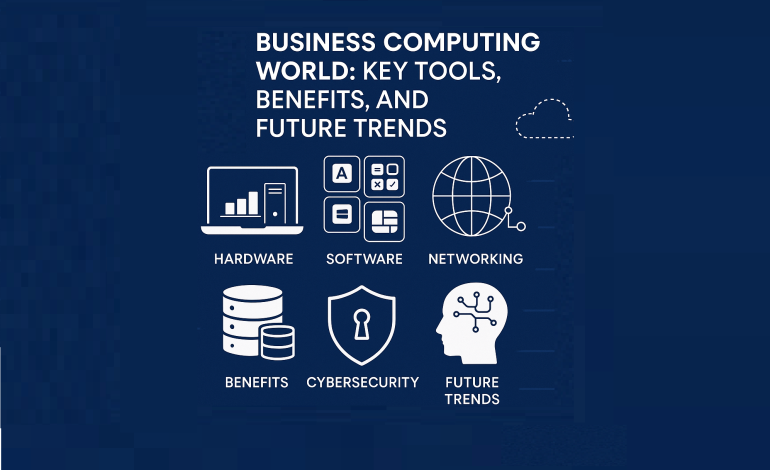Business Computing World: Key Tools, Benefits, and Future Trends

Using pace as the key to a new digital age; how else can you call ‘business computing world’? It is no longer mere jargon; it is fast transforming business wear into how it operates, grows, and competes-even from small startups to global corporations. Nearly all businesses should now include some form of digital computing, online tools, and software in the tools and resources they deploy in order to have success in an increasingly competitive marketplace.
The complete guide-an institutional guide to every important detail in the business computing world, its core essential components, benefits, challenges, and why it is increasingly important to all people-whether you are an entrepreneur, student, or simply curious about how technology works in business.
What Is the Business Computing World?
The business computing world is indeed an ecosystem where computing devices, software programs, and digital technologies help businesses perform their daily operations. From simple accounting software and cloud services to cybersecurity and state-of-the-art AI applications, it covers everything under it. In simple terms, business meets technology.
Computing helps businesses:
- Store and manage data
- Communicate with customers and teams
- Generate financial statements
- Manage human resources
- Maintain records and inventories
- Advertise and sell products
In the absence of digital tools, modern businesses would neither work efficiently nor grow well.
Why the Business Computing World Is Essential
Below are some reasons the business computing world is significant for businesses of all sizes:
Efficiency and Automation:
Automation are the tools that would achieve routine tasks across all organizations. It could be anything from invoicing to inventory management: automation speeds up processes and reduces human error, thereby allowing human resources to be available for work with real impact.
Data Management:
Data are the lifeblood of every enterprise. Companies generate volumes of data about their customers, trends, and performances. Using good data management tools, companies can harvest and harness these pools of information to enhance their decision-making processes.
Improved Communication:
No matter where you are, tools of business computing, such as e-mail, video conferencing software, and instant messaging platforms, are enabling organizations to communicate internally and externally quickly and efficiently.
Cybersecurity:
With threats from hackers on the increase, companies must protect their sensitive data. The business computing world covers tools like firewalls, antivirus programs, and encryption systems to secure company assets.
Innovations:
New computing technologies give room for innovating: releasing products, improving services, and enhancing customer experience.
Core Components of the Business Computing World
To have a good understanding of the digital environment, one needs to know about the areas that act as its building blocks:
Hardware:
Hardware involves the physical devices that perform computing tasks. These could be:
- Desktops and Laptops
- Servers
- Networking Equipment (Modems, Routers)
- Printers and Scanners
Reliability of hardware provides a platform for the achievement of effective operations.
Software:
Software involves applications that are used on hardware. Examples include:
- Microsoft Office Suite (Word, Excel, PowerPoint)
- Accounting packages like QuickBooks
- CRM systems like Salesforce or HubSpot
- Project management tools like Trello or Asana
Every business uses software to carry out its operations on a daily basis.
Networking:
Networking ties everything together so that devices can share data, have internet access, and communicate with the cloud. With a successful internal network in place, businesses remain real-time capable and, at the same time, have the resources available for access from anywhere.
Data Management:
These are the tools by which businesses secure the storage of data and its management like MySQL, Oracle, or Microsoft SQL Server. Data-driven decisions depend on properly structured information systems.
Cybersecurity:
With the presence of digital threats, cybersecurity is no longer up for negotiation. Key tools will include:
- Firewalls
- Antivirus
- Password Managers
- Data Encryption
The security of the digital environment shield will serve businesses against breaches that are likely to cost them a lot.
Artificial Intelligence (AI) and Machine Learning (ML):
AI and ML have created a wave of disruption for business computing today. End-user queries are answered through AI-empowered chatbots while sales trend prediction, fraud detection, or supply chain optimization can all be achieved using ML algorithms- without the slightest of swings out into the future.
How Industries Apply Business Computing
The business computing world sees plenty of applications throughout various industries. The following discusses how it affects the different sectors:
Retail:
- Inventory management software
- E-commerce platforms
- Online payment systems with security
- Loyalty program databases
Healthcare:
- Electronic Health Records (EHR)
- Online appointment scheduling
- Telehealth platforms
- Secure Communication With Patients
Finance:
- Online banking systems
- Investment management systems
- Fraud detection software
- Digital wallets and payment gateways
- No credit check loan
Education:
- Learning Management Systems (LMS)
- Virtual classrooms
- Online tools for testing and grading
- E-content development platforms
Manufacturing:
- Production automation systems
- Inventory and supply chain management
- Real-time monitoring with IoT sensors
- Robotics and predictive maintenance
Every industry tailors the business computing tools it requires to its particular concern.
Benefits of the Business Computing World
Adopting digital solutions brings numerous benefits to businesses:
- Speed: Work is done more quickly.
- Cost-effectiveness: Less manual labour is required.
- Accuracy: Reduced human error.
- Scalability: it will help all businesses expand and grow.
- Flexibility: platforms for cloud work allow work to be done anywhere.
Challenges in the Business Computing World
With advantages come drawbacks like:
- Cyber Threats: Continuity risks of hacking, phishing, and malware.
- Down Time: Systems crash and hence operations stall.
- Learning Curve: Employees will adjust to new systems.
- Privacy of Data: Adherence to data laws with regard to privacy is a matter of priority.
- Initial Costs: Implementation and maintenance costs are massive.
For these, good businesses should invest in the right efficient security and scalable solutions, as well as regular training for all employees.
The Future of Business Computing
The business computing world is changing quickly. The following are some of the major trends of the future:
- Cloud Computing: Businesses transfer their infrastructure and applications to the cloud to gain flexibility and savings.
- Remote Work Tools: Digital platforms supporting distributed teams continue to grow.
- AI and Automation: Smart tools being used more and more for decision-making, customer support, and data processing.
- Internet of Things (IoT): More devices that are connected and autonomous and communicate with one another.
- Blockchain: Transparent, secure, and decentralized data records will become the norm in finance, health care, and supply chains.
Such companies will have a place in the fog of competition and innovation.
Conclusion
Business computing World is deemed to be the backbone of present-day operation of business. It enables various companies to be smarter, grow faster, and serve a customer better. From the management of data to protecting property and innovating, computing has gone beyond being an optional requirement, it is now an essential one.
Business computing is definitely the most important aspect that can make small-time businesses or some large corporations put it towards better and more efficient performance in any business.
FAQs: Business Computing World
World of Business Computing?
It is an environment in which business enterprises manage their operations-intervention of finance, marketing, customer-service, and data management, through the use of computers, software products, and digital tools.
Why is computing important for small businesses?
Increased efficiency, decreased costs, improved decision making, and the ability to compete with the larger world of organizations.
What are important tools in the world of business computing?
Common tools would be Microsoft Office, Google Workspace, QuickBooks, Salesforce, Trello, Dropbox, and Zoom.
How can companies protect themselves from cyber threats?
Strong passwords, firewalls, antivirus software, encryption, updating regularly, training staff, and data backups on a regular basis.









